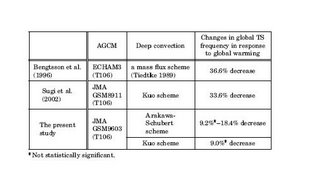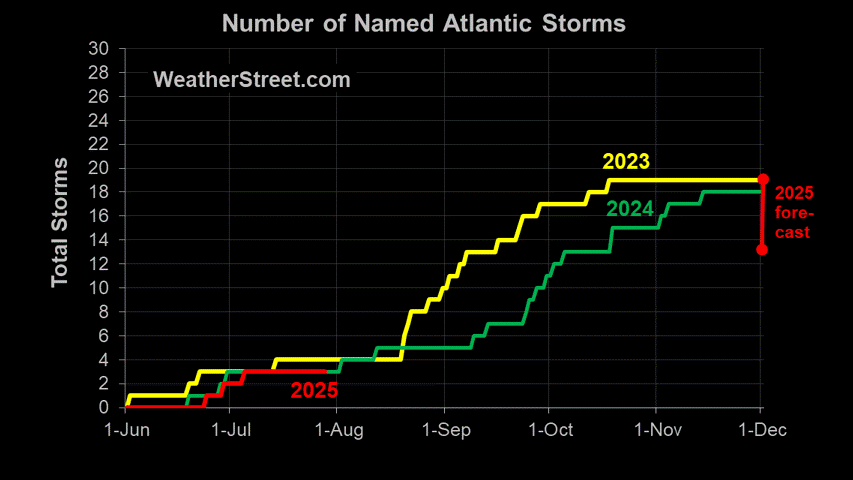Another study linking hurricane frequency with global warming - inversely
The first study discussed was by two LSU scientists published in Geophysical research Letters. In short:
They gathered data on start dates of hurricanes from 1851-2005, and found that “Other seasons with storms with early dates of occurrence include 1887, 1933, 1936, and 1995.” There is no trend here with three of the five years with early storms occurring between 1887 and 1936. They made no link to global warming, but they did conclude “All of these seasons are associated with a positive phase of the Atlantic Multidecadal Oscillation” which is the warm phase of the oscillation. (Emphasis added)In the other research article, from The Journal of the Meteorological Society of Japan, Yoshimura et. al. developed a model to investigate the effect of global warming on tropical cyclone activity. Their model accurately simulated the geographical distribution of tropical systems and realistically accounted for El Nino and La Nina conditions. One of the most frequent complaints about the models used to predict the potential effects of Global Warming is that the models do not accurately calculate the data to date yet alone predict the future. So this model is ahead of the curve to begin with.
Now for the bottom line on tropical storms (TS) and tropical depressions (TD) from the recent research out of Japan. In the global warming experiments, the team found the “frequency of TS formation decreases by 9.0–18.4% globally, and some of these changes are statistically significant. Total frequency of TSs and TDs decreases significantly in all of the warm-climate experiments. For relatively intense TCs (e.g., maximum surface wind > 25 m s-1), there are no coherent changes in global frequency.”
Is this big news that should surprise anyone interested in the subject? No — Yoshimura et al. present the table below showing the results from other research in which scientists used high resolution general circulation models to investigate hurricane frequency in response to global warming. As we see in their table, Bengtsson et al. (in 1996) gave it a go and found that global warming would decrease tropical storm frequency by 36.6% (Bengtsson et al. find similar results in a paper published too recently to be included in Yoshimura’s Table, see here for our coverage of the recent Bengstsson findings of decreased TC activity in a CO2-warmed world). Sugi et al. took a stab at the “problem” and found a 33.6% decrease in storm frequency (we are noticing a trend here) thanks to global warming. Yoshimura et al. used their various deep convection algorithms and found anywhere from a 9.0% to a 18.4% decrease in the tropical storms.
The reason I am bringing these studies up is that this is significant in the fact that the results of the study are the exact opposite of the claims by Gore and other global warming alarmists and that this is not being published anywhere except at the World Climate report. Maybe the half dozen or so of you who read my blog can help spread this information to show that the science regarding climate change is nowhere near being complete or fully understood and that the debate is just starting.
Trackbacked to: Dumb Ox News, Woman Honor Thyself, 123 Beta, Don Surber










<< Home